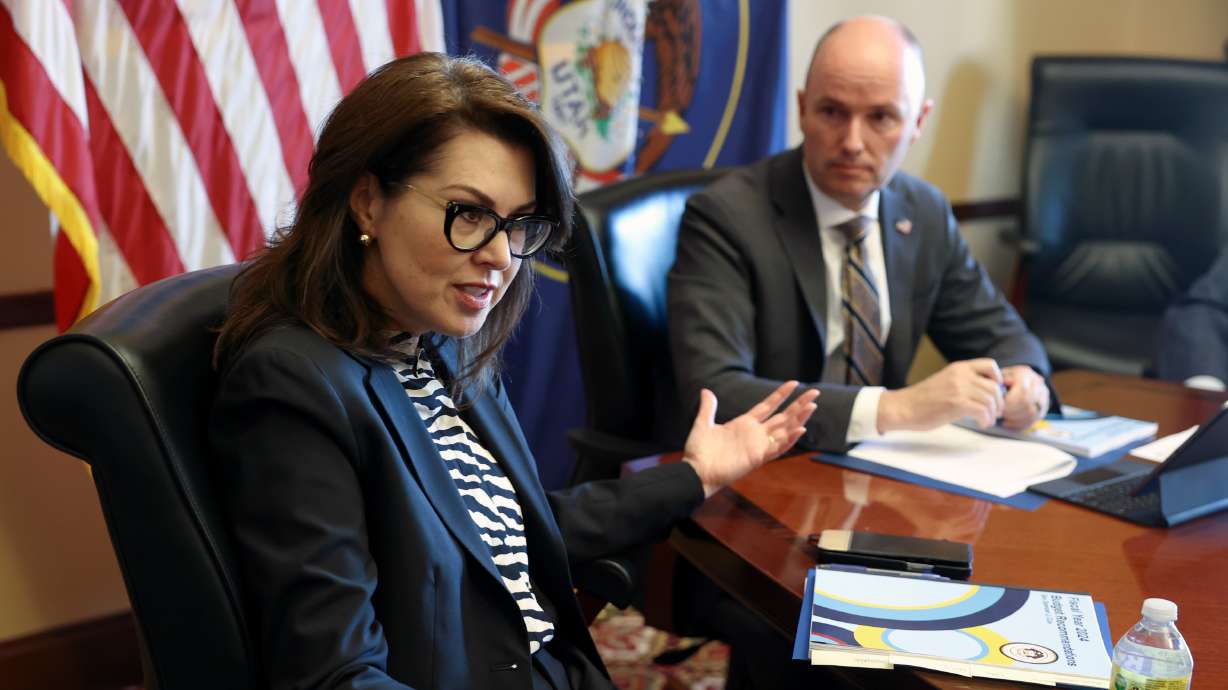Estimated read time: 4-5 minutes
This archived news story is available only for your personal, non-commercial use. Information in the story may be outdated or superseded by additional information. Reading or replaying the story in its archived form does not constitute a republication of the story.
SALT LAKE CITY — It's been more than three years since the 2020 presidential election, but a majority of Republican voters still believe that former President Donald Trump was the legitimate winner.
That's according to a poll conducted last month by Gallup and the Stavros Niarchos Foundation Agora Institute at Johns Hopkins University, which also found that just over a quarter of Republicans think President Joe Biden was the rightful winner.
There is no evidence of voter fraud in the 2020 election that would have changed the results.
With the 2024 election now less than a year away, Utah's Republican governor and second-in-command are looking to increase trust in elections among their conservative constituents. Lt. Gov. Deidre Henderson, the state's top election official, spoke Wednesday at a panel discussion titled "Conservative Agenda for Democracy," which was hosted by the R Street Institute on the campus of Johns Hopkins University in Washington.
Henderson said voters in Utah are "a little bit weird, and in a good way," because they generally have a lot of trust in elections in the state, while being more inclined to mistrust the results in other states. That's in line with the results from the Gallup poll, which found voters are more likely to say they have a lot of confidence in elections in their own state compared to out-of-state elections.
Among all Americans, 47% have a high degree of faith in elections in their state, but that number falls to 30% who trust elections in other states. Only 13% of conservatives who believe Trump won in 2020 have a high level of confidence in elections in other states.
In part because of Trump's wide margin of victory in Utah in 2020, election results in the state received less scrutiny compared to a swing state like Georgia, but there were still some "really loud voices" calling foul on the state's election administration, the lieutenant governor said.
"But even Utah ... where Trump won big, is not immune to these challenges," she said. "And that lack of confidence overall in our election system, which is so scary."
Utah Gov. Spencer Cox appeared at the panel discussion via a prerecorded video, and pointed to his "Disagree Better" initiative with the National Governors Association as a framework for increasing trust among conservative voters. He noted that elections are administered at a county level across the country, often by conservative election officials who believe in the legitimacy of the results.
And while various states and counties differ in precise policies for administering elections, he said, they share common best practices like testing machines, auditing the results after the fact and storing a paper trail in the event of challenges or recounts.
"Whether you live in a blue county or state or red county or state, this is generally how it's going to work — and it works well. And where differences among jurisdictions do exist, it provides us the opportunity to continuously improve elections," Cox said. "Elections can't be perfect, but today is an example of how we're always working to keep them getting better."
Henderson reiterated that the election system in the U.S. relies on election officials and volunteers at a local level. She said the state undertook an information campaign "to help people understand that those who are running the elections are their neighbors."
"These are the people that you go to school with. These are the people that you meet at the grocery store, that are in your church. ... These are the people who run our elections, not some faceless, nameless bureaucrats in Washington, D.C.," she said. "And if you trust the local elections — which most people do — those are the same elections where your federal officials were elected."
As the state's top election official, she said violent rhetoric against election officials is "real, and it's scary."
"I'm concerned about our election workers," she said, citing a high level of turnover at the county clerk positions throughout the state. State lawmakers have discussed beefing up legal protections for clerks and election workers in hopes of protecting them from such threats.
Just this week, election offices in at least five states received suspicious letters — some laced with the potentially deadly drug fentanyl — according to the Associated Press.
Henderson said her office has "no reason to believe Utah is a target," but urged election officials in the state to remain alert in the weeks leading up to Utah's Nov. 21 municipal and special election.
"Free and fair elections are a pillar of democracy," she said in a statement issued Thursday. "Political violence in any form will not be tolerated. Perpetrators should be punished to the fullest extent of the law."
"Political violence in ALL forms is despicable. We will not tolerate it," Henderson tweeted.










